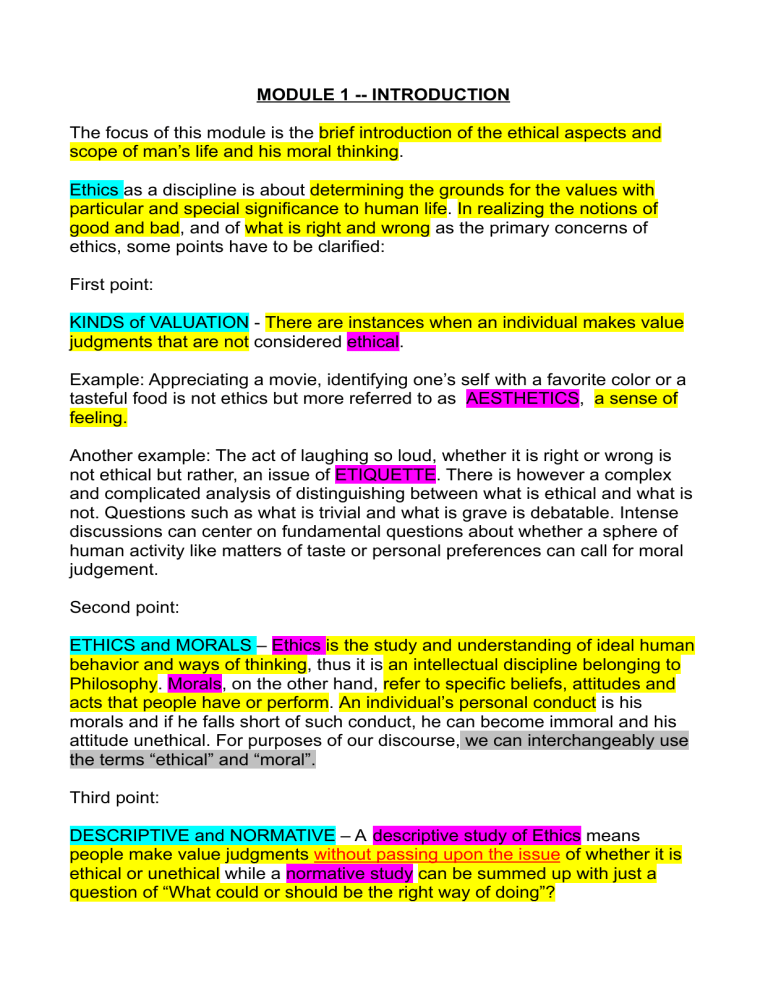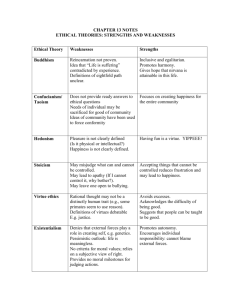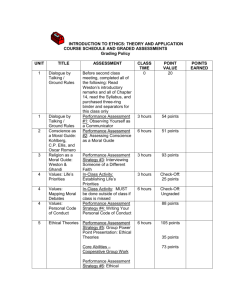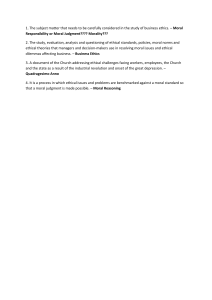
MODULE 1 -- INTRODUCTION The focus of this module is the brief introduction of the ethical aspects and scope of man’s life and his moral thinking. Ethics as a discipline is about determining the grounds for the values with particular and special significance to human life. In realizing the notions of good and bad, and of what is right and wrong as the primary concerns of ethics, some points have to be clarified: First point: KINDS of VALUATION - There are instances when an individual makes value judgments that are not considered ethical. Example: Appreciating a movie, identifying one’s self with a favorite color or a tasteful food is not ethics but more referred to as AESTHETICS, a sense of feeling. Another example: The act of laughing so loud, whether it is right or wrong is not ethical but rather, an issue of ETIQUETTE. There is however a complex and complicated analysis of distinguishing between what is ethical and what is not. Questions such as what is trivial and what is grave is debatable. Intense discussions can center on fundamental questions about whether a sphere of human activity like matters of taste or personal preferences can call for moral judgement. Second point: ETHICS and MORALS – Ethics is the study and understanding of ideal human behavior and ways of thinking, thus it is an intellectual discipline belonging to Philosophy. Morals, on the other hand, refer to specific beliefs, attitudes and acts that people have or perform. An individual’s personal conduct is his morals and if he falls short of such conduct, he can become immoral and his attitude unethical. For purposes of our discourse, we can interchangeably use the terms “ethical” and “moral”. Third point: DESCRIPTIVE and NORMATIVE – A descriptive study of Ethics means people make value judgments without passing upon the issue of whether it is ethical or unethical while a normative study can be summed up with just a question of “What could or should be the right way of doing”? Last point: ISSUE, DECISION, JUDGMENT and DILEMMA. When the situation calls for the weighing in of moral values, it becomes a moral issue. When a person is compelled or confronted by choosing what act to perform, it is called a moral decision. One who is an observer who makes an assessment on the actions or behavior of another makes a moral judgment. Finally, there is moral dilemma when a person in a complicated situation is torn between choosing between the lesser of two evils. The Wisdom of Reasoning Ethics is interested in two questions: Why does man decide that one way of doing is acceptable while its opposite is not? Another is, what reasons must he give to decide or to judge that a certain way of acting is either right or wrong? The fear of punishment or the desire for reward can motivate and provide man with reasons for acting in a certain way. But beyond punishments and rewards, it is possible for man’s moral valuation which is his decision and judgment to be on a higher moral ground and that is to be based on principle. Principles can be defined as rationally established and fundamental set of core values that justifies one’s view, concept, act, behavior, attitude and character. While people do maintain a set of principles, the same can be subjective and even relative. As such, Ethics can turn to a theory (a system of thoughts) to establish certain moral principles that will become the framework in evaluating man’s reasons for making certain decisions. SOURCES of AUTHORITY Man’s standard of values as a matter of practice, obedience and influence, is established by higher authorities and these are: Law – A system of rules that define and regulate the conduct of man in an organized society. It is a guide to one’s ethical behavior but not all its prescriptions are moral. Example (the imposition of death penalty, euthanasia, etc ). Religion – The idea that one is obliged to believe in his faith and obey his own supreme being or God. As a source of authority for ethical values, this is what we refer to as the divine command theory. Culture – A way of life in a certain group, community or society with its own distinct social norms, institutions and standards of valuations. When one speaks of ethical acceptability or unacceptability depending on his culture, we call this cultural relativism. SENSES Of SELF The opposite of authority in the sense that man’s standard of values is dictated by his own self and these are: Subjectivism –The person concerned solely determines what is good or bad to him and for him. An example is the most common and familiar expression,” I am entitled to my own opinion.” Psychological Egoism – Man is self-centered and his ego has its interests and desires and therefore all that he must do is focus towards satisfying his wants, needs and his own self-importance. Ethical Egoism – Man acts in a manner that seems to benefit other people but in reality, benefits him because his overriding concern is attaining his own end and purpose. UTILITARIANISM – An ethical theory that argues for the goodness of pleasure and the determination of right behavior based on the usefulness of the action’s consequences (Bulaong,etc). The distinctive core of this ethical theory is based solely on the human act. The right or wrong act is determined by the result whether the same is useful or not and whether it can give the greater good to a lot of people. Jeremy Bentham and John Stuart Mill were among the two foremost utilitarians who learned that happiness experienced through pleasure by the greatest number of people is intrinsically good even at the expense of some individual rights. Utilitarianism is consequentialist. Principle of Utility This is a principle (by Jeremy Bentham) that says man’s actions are determined and governed by two sovereign masters in his life and these are pain and pleasure. The principle explains that all our actions are motivated and dictated either and only by two ways and choices: avoid pain or desire pleasure. Bentham provided a scale for evaluating pain and pleasure known as felicific calculus. It is a framework that calculates the pleasure that some actions can produce regardless of moral preferences and values making as basis the quantity and extent of such actions. Principle of the Greatest Number This is a principle (by John Stuart Mill), arguing that utilitarianism is not all about an individual, no matter how noble, intellectual or mighty he can be enjoying happiness but more importantly, the happiness and pleasures of the greatest number of people affected or influenced as a consequence of a human act. Mill opposes single scale of pleasure for a plurality of actions, and argued that pleasures must be distinguished qualitatively than quantitatively. He viewed that an excessive quantity of pleasure might result in pain and further believe that human pleasures are qualitatively different from animal pleasures, in as much as higher intellectual pleasures are preferable than purely sensual appetites. Justice and Moral Rights From the viewpoint of utilitarianism, the quality of being just and righteous, fair and equitable is justice when it respects rights that are directed towards acts that pursue the greatest happiness to the greatest number. Moral rights then becomes just within the context of the principle of utilitarianism as long the actions produce happiness that is greater than the unhappiness as a consequence of their implementation. According to Mill, issues about what is just carry strong emotional import because the category of moral rights directly associated with justice strikes at the very heart of man’s most vital interests predicated on his right to life but which is also the right of the ‘’ many others.’’ Thus, as citizens, cherished rights like due process of law, free speech and choice of religion gives general happiness which the society and government must defend and protect. Mill added further that when legal rights are not morally justified, they ought not to be respected.





